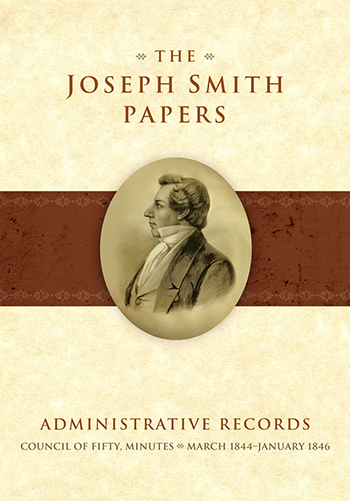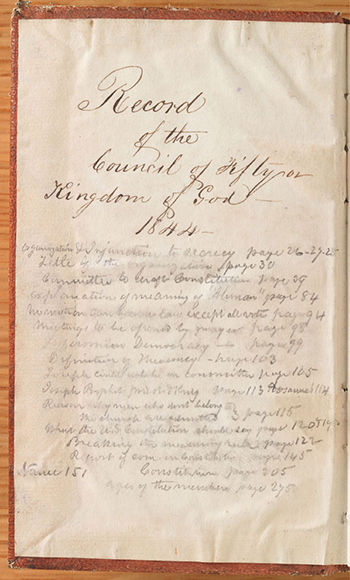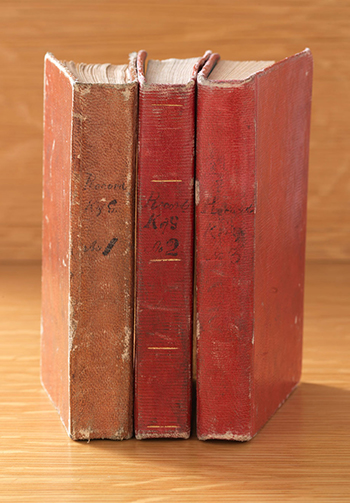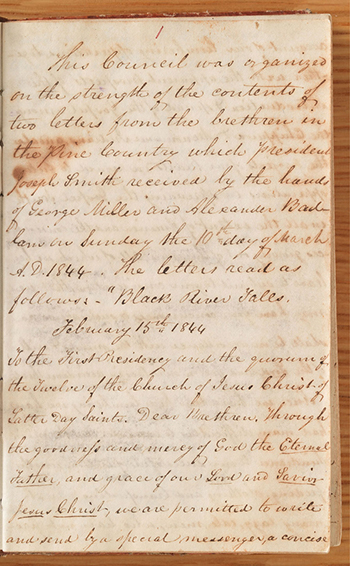Newly Published Joseph Smith Papers Are a Treasure Trove of Information Online
Contributed By Trent Toone, Deseret News

The Joseph Smith Papers feature the minutes from the Council of Fifty meetings held in Nauvoo, Illinois, in the 1840s. The minutes were compiled in three small bound volumes by William Clayton, who was appointed clerk of the Council of Fifty at its first meeting in Nauvoo. Photo courtesy of the Joseph Smith Papers Project.
Article Highlights
- Two years after the Joseph Smith Papers first published the Council of Fifty minutes in print, the minutes are now available online.
Related Links
The Council of Fifty minutes, once unavailable for public inspection, are now freely accessible online.
First published in print as part of the Joseph Smith Papers in 2016, the Council of Fifty minutes are the records of an organization that Joseph Smith created in March 1844 with about 50 of his closest associates to become what they believed would be the governing core of the literal kingdom of God on earth.
The minutes, including images of those records and some new content, were uploaded Thursday on josephsmithpapers.org.
The Nauvoo-era minutes of the Council of Fifty are a treasure trove of information for the last two years of The Church of Jesus Christ of Latter-day Saints in Illinois, said Jeffrey D. Mahas, a historian and volume editor with the Joseph Smith Papers.

The Joseph Smith Papers feature the minutes from the Council of Fifty meetings held in Nauvoo, Illinois, in the 1840s. The minutes were compiled in three small bound volumes by William Clayton, who was appointed clerk of the Council of Fifty at its first meeting in Nauvoo. Photo courtesy of the Joseph Smith Papers Project.

The Joseph Smith Papers feature the minutes from the Council of Fifty meetings held in Nauvoo, Illinois, in the 1840s. The minutes were recorded in three volumes by William Clayton. Photo courtesy of the Joseph Smith Papers Project.

The Joseph Smith Papers feature the minutes from the Council of Fifty meetings held in Nauvoo, Illinois. The minutes are contained in three volumes that have been in the custody of the Office of the First Presidency since the 1880s, when the Council of Fifty was disbanded, and were transferred to the Church History Department in 2010. Photo courtesy of the Joseph Smith Papers Project.

William Clayton recorded the minutes of the Council of Fifty in three volumes from March 1844 until January 1846. Photo courtesy of the Joseph Smith Papers Project.
“This is a landmark of historical transparency,” Mahas said. “In just a few years the Nauvoo Council of Fifty minutes have gone from one of the most mysterious, closely guarded records in Mormon history to being available and searchable in print and online.”
Under Joseph Smith’s leadership, the council debated proper forms of government, petitioned the United States Congress, planned Joseph’s presidential campaign, and contemplated establishing a government of its own in western North America. One of the main themes of the council under Joseph’s leadership is the importance of religious liberty, Mahas said.
“In the minutes, Church leaders come alive with emotion as they discuss their frustration and anger with the United States, which they believed had failed them, as well as with their hope and faith that the Lord would guide them,” Mahas said.
Along with the previously published minutes, more than 125 documents from March, April, and May 1844, including letters, discourses, deeds, and other Nauvoo City Council business, are now online. Among the new documents is a letter to presidential candidate Henry Clay and a discourse about the spirit of Elias, Elijah, and the Messiah.
“These documents were either created for or at the direction of the Council of Fifty or were directly connected to council business. These include letters of recommendation, correspondence regarding lobbying work in Washington, D.C., or Joseph’s presidential campaign,” Mahas said.
Members of the Council of Fifty were required to swear an oath of secrecy, and the existence of the council was kept secret, along with its records. At times the minutes, kept by the William Clayton, the council’s clerk, were burned to keep them from falling into enemy hands, Mahas said.
Joseph Smith instructed Clayton to burn or bury the records before he went to Carthage, Illinois, in June 1844. Clayton elected to bury the records and found them damaged after Joseph’s death. He began copying the records into the small minute books and continued to do so after Brigham Young reorganized the council in 1845, Mahas said.
Under Brigham Young’s leadership the council helped plan the exodus from Nauvoo. After the establishment of Utah Territory, the importance of the Council of Fifty diminished. The last recorded meeting of the council was in 1885, Mahas said.
Brigham Young came to possess the minute books, and from that time on they were closely guarded. As a result, the minutes gained a kind of mystique as Mormon scholars wondered what might be hiding in the records, Mahas said.
“Over time the minutes became a sort of litmus test of transparency,” Mahas said. “If that church was really serious about transparency, then why wouldn’t they release the minutes of the Council of Fifty?”
In 2016 the Joseph Smith Papers published the entire set of Nauvoo records, Administrative Records: Council of Fifty, Minutes, March 1844–January 1846.
For more information on the Council of Fifty minutes, visit josephsmithpapers.org.
